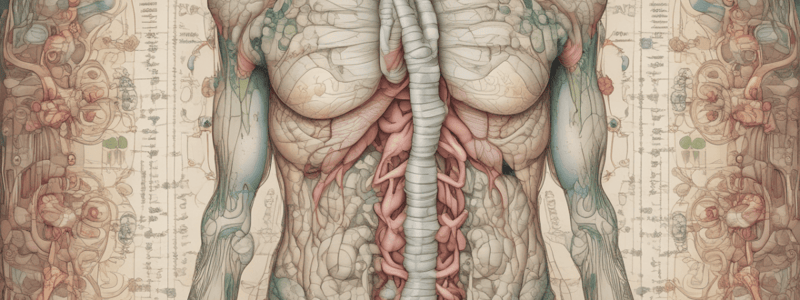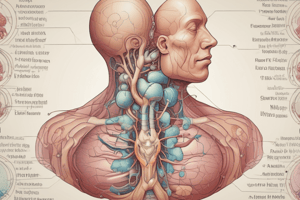Podcast
Questions and Answers
Which thyroid hormone is significantly less biologically active than T3?
Which thyroid hormone is significantly less biologically active than T3?
- T4 (Thyroxine) (correct)
- TSH-binding protein
- Thyroid stimulating hormone
- T3 (Triiodothyronine)
What does T3 stand for regarding thyroid function?
What does T3 stand for regarding thyroid function?
- Triiodothyronine (correct)
- Triiodothyroxine
- Thymosin III
- Tetrodotoxin
Which thyroid hormone has a longer half-life, according to the text?
Which thyroid hormone has a longer half-life, according to the text?
- TSH-binding protein
- T3 (Triiodothyronine) (correct)
- T4 (Thyroxine)
- Thyroid stimulating hormone
Which hormone stimulates the thyroid gland to secrete T4 and T3?
Which hormone stimulates the thyroid gland to secrete T4 and T3?
In hypothyroidism, which of the following levels is typically elevated?
In hypothyroidism, which of the following levels is typically elevated?
Which enzyme attacked in Hashimoto's Disease is crucial for producing thyroid hormones?
Which enzyme attacked in Hashimoto's Disease is crucial for producing thyroid hormones?
What is a common symptom of hypothyroidism related to the skeletal muscles?
What is a common symptom of hypothyroidism related to the skeletal muscles?
Which of the following is NOT a common sign/symptom of hypothyroidism?
Which of the following is NOT a common sign/symptom of hypothyroidism?
What is a typical laboratory finding in individuals with hypothyroidism?
What is a typical laboratory finding in individuals with hypothyroidism?
Which group should receive thyroid replacement therapy (TRT) to improve their condition?
Which group should receive thyroid replacement therapy (TRT) to improve their condition?
What is a goal of thyroid replacement therapy (TRT) in hypothyroid patients?
What is a goal of thyroid replacement therapy (TRT) in hypothyroid patients?
What is the role of TRH in the regulation of thyroid hormones?
What is the role of TRH in the regulation of thyroid hormones?
Which gland is responsible for detecting low levels of thyroid hormones in the body?
Which gland is responsible for detecting low levels of thyroid hormones in the body?
In primary hypothyroidism, what happens to TSH levels?
In primary hypothyroidism, what happens to TSH levels?
How does the hypothalamus respond to persistently low levels of thyroid hormones?
How does the hypothalamus respond to persistently low levels of thyroid hormones?
What is the effect of elevated levels of thyroid hormones on TRH secretion?
What is the effect of elevated levels of thyroid hormones on TRH secretion?
Why does TSH levels remain low in hyperthyroidism?
Why does TSH levels remain low in hyperthyroidism?
How long does it typically take for symptoms to lessen after starting thyroid treatment?
How long does it typically take for symptoms to lessen after starting thyroid treatment?
When should TSH and FT4 levels be monitored after initiating thyroid treatment?
When should TSH and FT4 levels be monitored after initiating thyroid treatment?
What is the recommended monitoring frequency once TSH levels are within the normal range?
What is the recommended monitoring frequency once TSH levels are within the normal range?
If a patient becomes pregnant while on thyroid medication, what may be required?
If a patient becomes pregnant while on thyroid medication, what may be required?
How should thyroid medication be taken to ensure optimal absorption?
How should thyroid medication be taken to ensure optimal absorption?
What is the recommended action if signs of hyperthyroidism are observed while on thyroid hormone replacement?
What is the recommended action if signs of hyperthyroidism are observed while on thyroid hormone replacement?
What is the rationale for combining T4 with T3 in hypothyroid patients with normalized TSH but persistent symptoms?
What is the rationale for combining T4 with T3 in hypothyroid patients with normalized TSH but persistent symptoms?
Based on the guidelines provided, what is the daily replacement dose of Levothyroxine (Synthroid®) for adults ≥ 61 years of age without evidence of cardiac disease?
Based on the guidelines provided, what is the daily replacement dose of Levothyroxine (Synthroid®) for adults ≥ 61 years of age without evidence of cardiac disease?
What is the recommended time to take synthetic T4 replacement medication according to the text?
What is the recommended time to take synthetic T4 replacement medication according to the text?
What is the target range for TSH levels in patients receiving synthetic T4 replacement therapy?
What is the target range for TSH levels in patients receiving synthetic T4 replacement therapy?
How often should the dose of synthetic T4 replacement be adjusted if needed?
How often should the dose of synthetic T4 replacement be adjusted if needed?
What is the purpose of looking for hyperthyroid symptoms in hypothyroid patients during replacement therapy?
What is the purpose of looking for hyperthyroid symptoms in hypothyroid patients during replacement therapy?
Flashcards are hidden until you start studying
Study Notes
Thyroid Gland Functions
- Thyroid gland secretes thyroid hormones (THs) independently, producing more T4 (Thyroxine) than T3 (Triiodothyronine) into circulation.
- T4 is solely produced by the thyroid gland and is less biologically active than T3.
- T3 is more biologically active than T4 and has a half-life of 1 day.
Thyroid Hormone Conversion
- T4 is converted to T3 in peripheral tissues.
Thyroid Function Tests (TFTs)
- TFTs measure Free T4 (FT4) and Thyroid-Stimulating Hormone (TSH) levels.
- Normal FT4 levels: 0.8-2.7 ng/dL.
- Normal TSH levels: 0.5-4.7 mIU/L.
Hypothyroidism
- Condition characterized by decreased thyroid gland activity and compensatory increase in TSH.
- Primary hypothyroidism can be caused by Hashimoto's Disease, which involves antibodies attacking the thyroid gland.
Signs and Symptoms of Hypothyroidism
- Dry, thin, cool, coarse skin and hair.
- Diffuse alopecia.
- Puffy face, hands, and feet.
- Brittle nails.
- Cool peripheral extremities.
- Slowed reflexes and speech.
- Bradycardia.
- Weight gain with poor appetite.
- Tiredness, weakness, and low energy level.
- Memory impairment.
- Muscle aches and stiffness.
- Carpal tunnel syndrome.
- Cold intolerance.
- Hoarseness.
- Constipation.
- Menstrual irregularities.
- Gradual onset of symptoms.
Diagnosis of Hypothyroidism
- Signs and symptoms.
- Lab tests: low FT4 and high TSH.
- Positive TPO antibodies.
Goals of Thyroid Replacement Therapy (TRT)
- Restore thyroid hormone levels within tissues.
- Provide symptomatic relief.
- Prevent neurologic deficits in newborns and children.
- Normalize labs.
Who Should be Treated?
- Patients with TSH > 11 mIU/L.
Thyroid Replacement Therapy (TRT)
- Restore thyroid hormone levels within tissues.
- Use synthetic thyroid hormone (T4) Levothyroxine (Synthroid).
- Dosing: 1.6 mcg/kg/day IBW for adults ≤60 years old without cardiac disease.
- Dosing: 25-50 mcg once daily for adults ≥ 61 years old without cardiac disease.
- Dosing: 12.5-25 mcg/day and titrate up based on tolerability for patients with cardiac disease or TSH 5-10 mIU/L.
- Monitor TSH and FT4 levels ≥ 6 weeks after initiation or any dose adjustments.
- Treatment is lifelong.
Studying That Suits You
Use AI to generate personalized quizzes and flashcards to suit your learning preferences.




